French presidential campaign shaken by war in Ukraine
Emmanuel Macron's presidential mandate has been disrupted in its last few weeks by the return of war in Europe. After coronavirus and the social 'yellow vest' crisis, this could benefit Macron who remains this race’s favourite, even though his programme for the next five years is unclear
The campaign revived
The French presidential campaign was, before 24 February, regularly described as lacklustre, with debates struggling to take off. The war in Ukraine could have made it definitively inaudible, but the opposite has happened. The French have finally begun to scrutinise the electoral offer, which is now being redesigned around issues linked to the conflict: NATO, the European Union, energy independence, military strategy, immigration and nuclear weapons. For the first time, the differences between the candidates on these subjects are clearly visible, as well as their strategies. The far-right candidates Eric Zemmour (14% of voting intentions) and Marine Le Pen (17% of voting intentions), as well as the far-left candidate Jean-Luc Mélenchon (12% of voting intentions), have often appeared to have something of a casual attitude towards the Russian president Vladimir Putin, and this puts them in difficulty.
Valérie Pécresse, the candidate of Les Républicains (right-wing) with 12% of voting intentions, is trying to seize the opportunity by posturing herself in support of French and European decisions and by redirecting her criticism towards Zemmour and Le Pen. Anne Hidalgo, the candidate of the Socialist Party (left), who has fallen extremely low with only 1.5% of voting intentions, is trying to do the same by targeting Mélenchon, but remains hardly visible among the slew of left-wing candidates, including the ecologist Yannick Jadot (6.5% of voting intentions) and the communist Fabien Roussel (4% of voting intentions).
Macron likely to win, but with what programme?
In all likelihood, the conflict should benefit Emmanuel Macron who, according to surveys, tends to outperform his opponents in his perceived ability to manage the consequences of serious crises. He is leading in all polls, with 25% of the vote in the first round, and should therefore benefit from his image as a president who takes responsibility in times of crisis. All the polls indicate that he should also win the second round, regardless of his opponent.
Nevertheless, the current situation forces Macron to review the posture he intended to adopt in his campaign, which he wanted to be "positive and empathetic". Macron intends to "govern until the last quarter of the hour" by devoting himself to crisis management, but also by appropriating the two themes that he has been suffering from until now and that are coming back in force: purchasing power and immigration.
Despite a likely victory for Macron, the disrupted campaign makes it very difficult at this stage to identify what economic policy will be in place in France over the next five years, beyond the immediate management of the crisis. Among the major issues is obviously the question of debt sustainability and public finances. Macron had been elected in 2017 on the promise of fiscal seriousness. Since then, the “yellow vests” crisis, the pandemic and its "whatever the cost" solution, the sharp rise in energy prices and the measures to combat their impact have turned things around and the budgetary floodgates have been opened wide. The public and the candidates seem to be completely uninterested in the subject for now, but the question of future fiscal policy is likely to arise very soon because public debt has risen sharply. In addition, the issue of pension reform, postponed due to the pandemic, will also be crucial over the next five years. Finally, some progress will have to be made on the issue of reindustrialisation, a topic which has been in the news for weeks.
In conclusion, the probability is high that Macron will be re-elected for a second term. However, the economic policy that will be implemented during the next five years remains very unclear for now.
Download
Download article
3 March 2022
ING Monthly: The Russia-Ukraine crisis forces a global reassessment This bundle contains {bundle_entries}{/bundle_entries} articlesThis publication has been prepared by ING solely for information purposes irrespective of a particular user's means, financial situation or investment objectives. The information does not constitute investment recommendation, and nor is it investment, legal or tax advice or an offer or solicitation to purchase or sell any financial instrument. Read more
